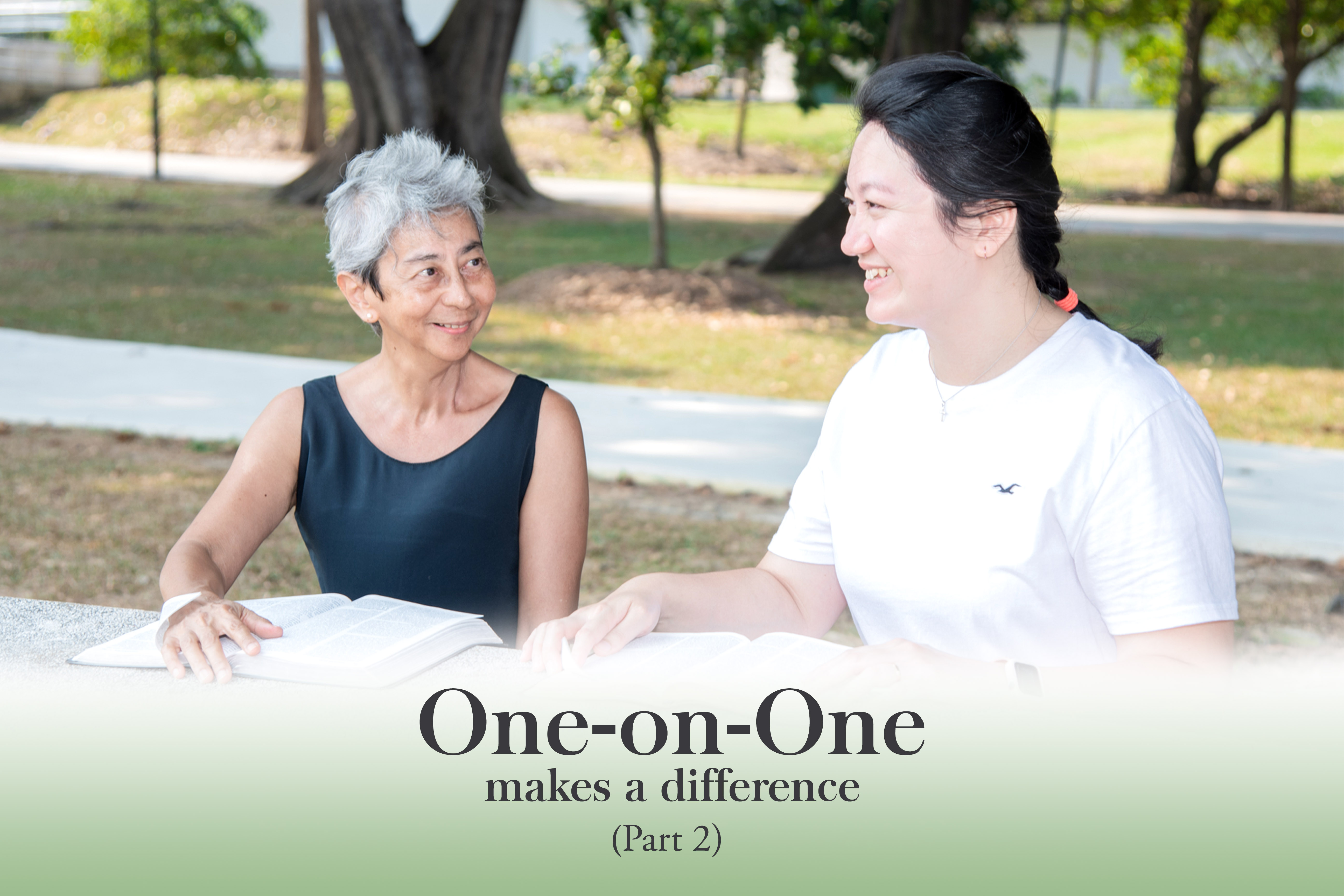One-on-One Makes a Difference — Part 2
By Yap Kim Meng,
Former National Director and Senior Mentor of The Navigators Singapore

(Click here for Part 1)
Historical Shift
I started writing One-on-One Makes a Difference after my first meeting with my neighbour, JK. He experienced the tragic loss of his wife, who passed away suddenly in her sleep, leaving behind their three children, with the youngest being just 10 months old at the time.
Over the course of five years, he was faced with the challenge of coping with grief while reconciling his Christian faith (having embraced the faith only six months before his wife’s passing). Oftentimes, I would bump into him in the corridor, offer a listening ear, cry and pray with him.
Later on, I started a Bible Study for taxi drivers and invited him to join us. He said, “Everybody was giving me advice. But nobody helped me to grow in my faith. You taught me how to read the Bible and memorise scriptures, enabling me to understand the faith more deeply. Now, even my children think that I know the Bible very well.”
Once, he encountered 4 men who queried him on his faith when they saw his Bible on the dashboard of his taxi.
“Uncle, you speak in tongues or not?”
Without turning around, JK quoted 2 Corinthians 5:17 and Galatians 2:20, and proceeded to explain their meanings. They were dumbfounded and weakly commented, “Uncle, you know your Bible very well.”
Dr T runs his own urology clinic at Gleneagles Hospital. He was a “quiet” Christian when I first met him. Upon discovering his interest in joining a mission trip and his need for spiritual guidance in preparation, my one-on-one ministry with him began. We met every Tuesday at 7:30 am in Botanic Gardens.
Over the years, he would invite his patients to join our meetings, and they would attend our meetings as he treated his patients well and would pray for them. Our Tuesday morning sessions have now evolved into a regular gathering of five men, coming together for fellowship around the Word and Prayer.
3 out of my 4 children studied at Anglo-Chinese Junior College (ACJC). I met PS at one of the fathers’ prayer group meetings in ACJC and handed him a copy of my book. PS drives a taxi and is a father of 5 children. He came to me after reading the book and said, “My son said I never teach the family how to pray. Can you show me how to do it so that I can go home and teach my children?” Since then, we met fortnightly at a coffeeshop for our one-on-one time.
In 2014, 3 full-time staff joined us in the Nav Alumni Community Ministry. Our vision was to witness our alumni re-engage in serving and labouring for God. Although our goal was to encourage one-on-one interactions, progress was slow. Hence, we organised our first “One-on-One Makes a Difference” event at a pub, where 60 people gathered to hear 6 men (whom I had been assisting) share their experiences. We adopted a bottom-up approach, aiming to encourage and inspire people through the testimonies of these men who have benefited from their one-on-one sessions with me, instead of a top-down directive of telling them what to do.
As they shared, others could sense the authenticity and simplicity of what we do. While we incorporate scriptures in our Bible Study, we are largely adopting the Ezra 7:10 approach of “study, observe, teach”, which is less content-heavy as compared to our usual Bible Studies. Prayer is genuine and practical, and meetings are held regularly – either weekly, fortnightly or monthly to accommodate the busy ones. Meetings can be one-on-one or in a triad.
The environment is characterised by trust, acceptance, and a deepening of relationships. There is no pressure to meet a perceived standard; it is simply a “Come Alongside” initiative, walking alongside a friend who is struggling with life’s issues while practising the Christian faith. Everyone can benefit from some encouragement and guidance. Upon hearing this, many exclaimed, “This, we can do!”
Many of the alumni came from a campus background, but at their current life stage, juggling family, career and church involvement, they find it challenging to replicate their past campus activities. Ministry work has taken on a different flavour.
A “Weak Mandate"
In his book “The Word made Flesh”, Eugene Patterson drew our attention to Luke 9:52-19:27, where Jesus’ ministry traversed through Samaria, culminating in Jerusalem where he encountered the cross and his ultimate death. Despite this impending fate, Jesus took the time to interact with the people as he journeyed through the Samaritan Travel Narrative, sharing stories to illustrate his teachings. Especially noteworthy are the 10 parables exclusive to the Gospel of Luke, such as the familiar stories of the “Prodigal Son” and “The Good Samaritan”.
The stories that Jesus told captivated his audience. Almost inevitably, the listeners found themselves woven into the narratives. He deliberately left the stories open-ended, allowing the audience to draw their own conclusions. Jesus devoted one-on-one time to individuals, answered questions and settled disputes.
Eugene pointed out that even as Jesus’ imminent end drew near as they approached Jerusalem, Jesus appeared to be in no great hurry. He treated people and their problems with significance and showed them how to navigate daily life. He walked alongside them amid their difficulties, disappointments and distress. This approach is integral to “discipleship training” for all believers.
Dr C. meets with me weekly, accompanied by JK. Both of them are my neighbours. Dr C. has a wife who suffers from severe OCD (Obsessive Compulsive Disorder). Just imagine the turmoil the family had to endure when his wife used undiluted Dettol to wash their three young children during their formative years. When this was disclosed at one of our one-on-one meetings, there was an audible gasp of disbelief from the audience.
These days, to meet up with these two men, I rent a car and drive JK to his workplace in Tuas, while Dr C. tags along with us. This provides me with greater one-on-one time as we travel in the car, and extra time at the coffeeshop near his workplace for sharing and prayer. Later, I would drive Dr C. back to our place, which is conveniently located near his workplace. Both of them face challenges in raising their young families, each with 3 children — one without a wife and another with a wife suffering from OCD.
EM’s world caved in when he found out that he had a tumour in his brain. He underwent 6 months of chemotherapy, and prayers poured in from all corners of the world. Miraculously, he recovered and was healed — the tumour disappeared. I remember spending 10 days out of the initial 14 days with him, in and out of the hospital, after he collapsed in his school’s toilet. What ensued was a series of numerous visitations and times of prayer.
“Structured” ministry took a backseat as we were physically and emotionally drained. To me, he was closer than a brother.
AC, a Hong Konger, married YC, a Singaporean. They have two young children aged 7 and 14. I know his brother, who is part of the Hong Kong ministry that I have had the privilege of visiting regularly, almost annually. He suggested that I should meet up with AC. Hence, we met, and I encouraged him in his faith.
He was then posted to Shanghai for work, so he relocated his entire family with him. Later, his wife YC found out that she had cancer and returned to Singapore for chemotherapy. The children stayed in Singapore to attend the Singapore International School and were cared for by his elder sister. AC continued working in Shanghai and has been commuting between three countries. 10 months later, YC was miraculously healed, and we rejoiced together. Each time AC and I met, it was to encourage and comfort him. I listened to him and prayed with him.
In 1 Samuel 22:2, 400 men joined David when he was on the run from King Saul. They were described to be in the category of the 3Ds — Debt, Distress, Discouragement or Discontentment —not a flattering description of people facing many difficulties or dire needs.
In reality, this aptly describes many of the people that we meet in our daily lives. Once we get past the initial layers of one’s life, we see that it is messy. Life is not so straightforward. It can be complicated and stressful. How then, do we fulfil the mandate to “go and make disciples”?
In these contexts, the only form of ministry possible is “Come Alongside” in the role of the Holy Spirit (“paraclete”) — walking alongside a friend, praying together, and encouraging one another. It may appear to be a seemingly weak form of discipleship, but it has proven to be a powerful source of encouragement for many.
“This, I can do!” is the recurring affirmation we have received from many alumni.
(Click here for Part 3)



